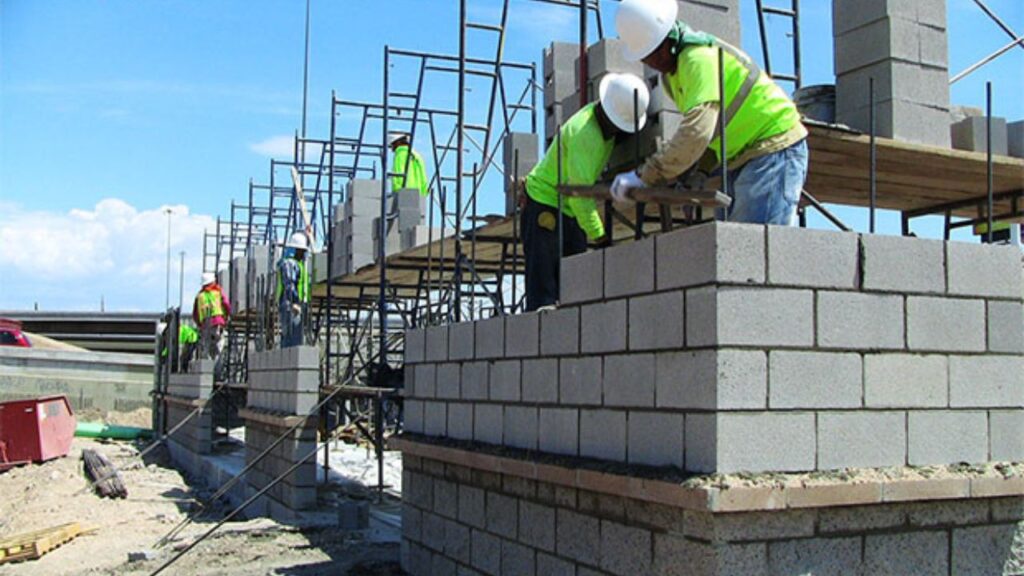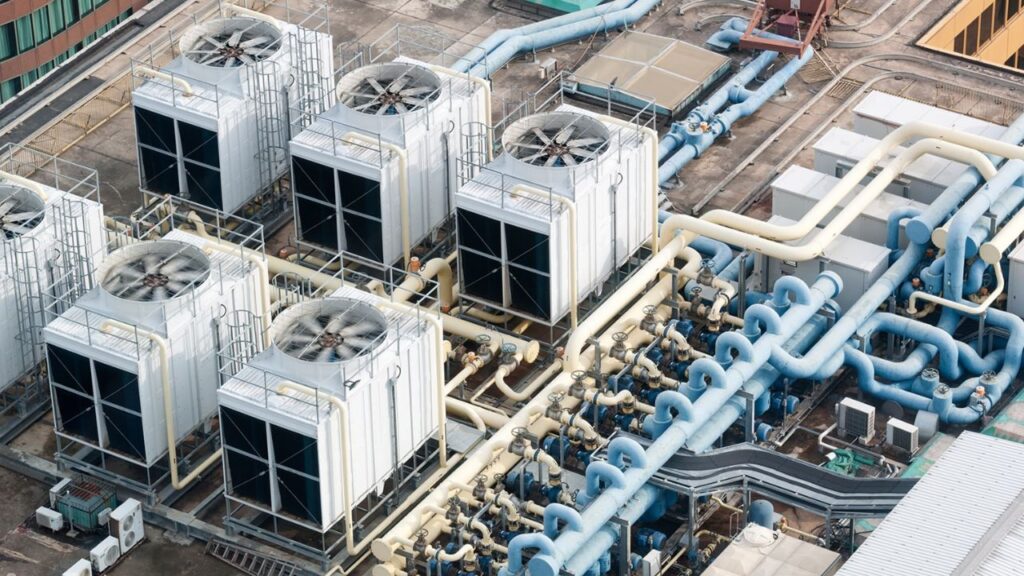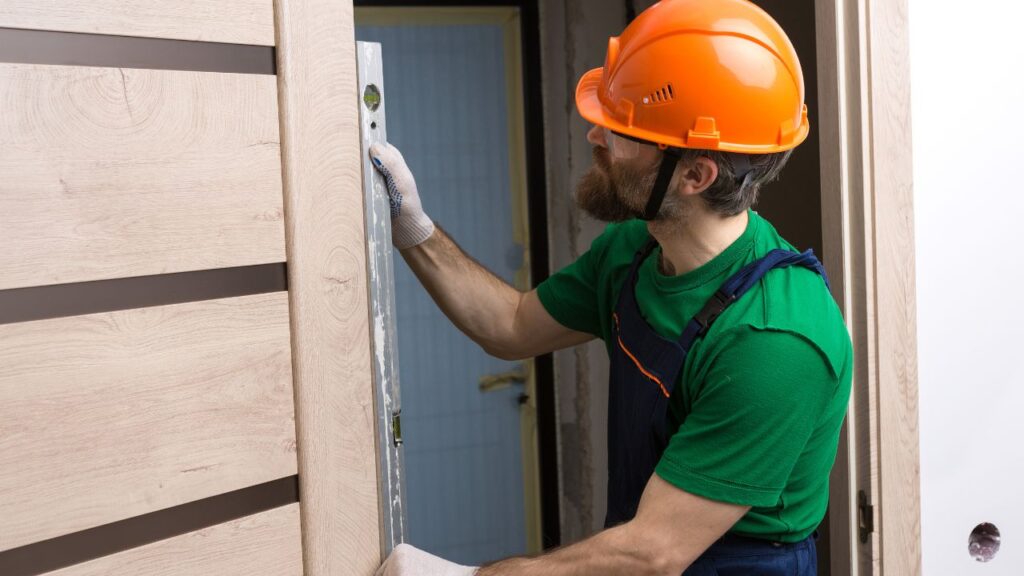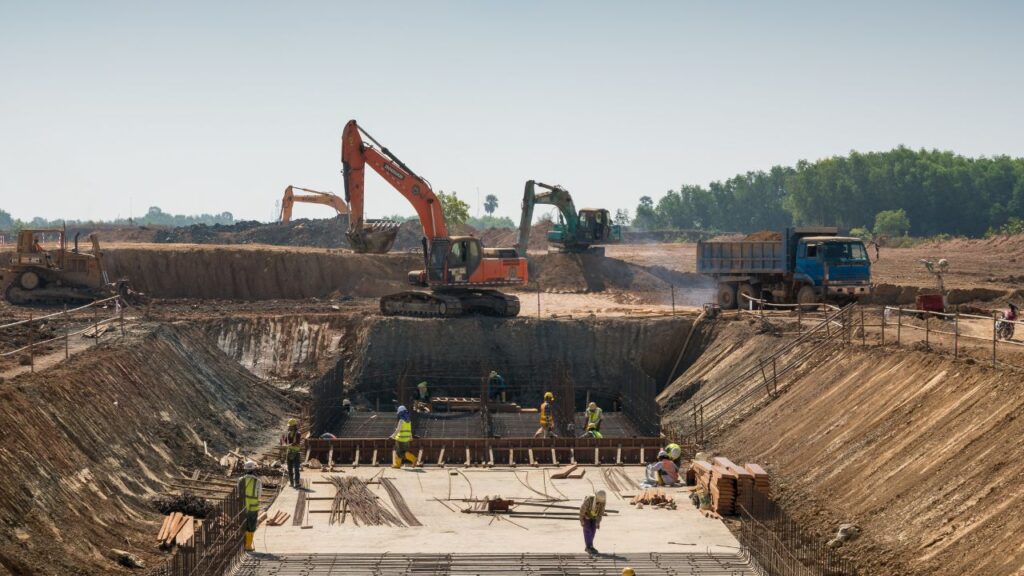- Homepage
- Blogs
Basement Renovation Cost Estimator
Leading provider of basement renovation cost estimating.
The average cost for a basement renovation can range from $20,000 to $80,000, depending on the scope of the project, the quality of materials, and the finishes selected. Basic basement renovations may fall in the $20,000 to $35,000 range, while high-end renovations with premium materials and extensive customizations can reach upwards of $70,000 to $100,000.
While focusing on your basement, plan your full renovation budget to include other areas of your home for a cohesive upgrade.
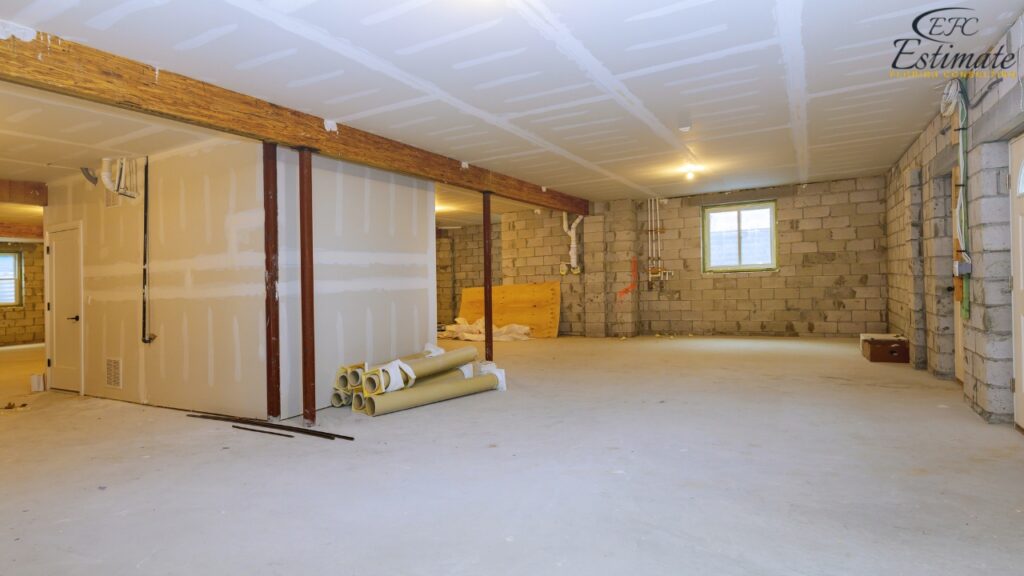
Average Basement Renovation Costs by Scope
Scope of Renovation | Average Cost Range |
Basic Finish | $20,000 – $35,000 |
Mid-Range Renovation | $40,000 – $60,000 |
High-End Remodel | $70,000 – $100,000 |
Detailed Cost Breakdown for Basement Renovations
Renovating a basement involves various components that add to the overall cost, from flooring and wall finishes to lighting, plumbing, and HVAC. Here’s a detailed cost breakdown for each major aspect.
Flooring Costs
Flooring is a prominent feature in basement renovations and is available in a range of materials, each with its own price point. The choice of flooring often depends on budget, desired aesthetics, and durability needs, as basements can sometimes be prone to moisture.
Flooring Type | Cost per Square Foot |
Carpet | $3 – $7 |
Vinyl Plank | $5 – $10 |
Tile | $8 – $15 |
Hardwood | $10 – $20 |
- Carpet: An economical choice, providing warmth and comfort but may not be ideal in moisture-prone basements.
- Vinyl Plank: Offers moisture resistance and durability, making it suitable for basements.
- Tile: Durable and moisture-resistant, though it can be more costly and feel cooler underfoot.
- Hardwood: Often used for high-end basement renovations but may require additional sealing to prevent water damage.
Win More Projects With Us
Wall and Ceiling Finishes
Wall and ceiling finishes help transform a basement into a comfortable living area. Insulated drywall is common for energy efficiency, while drop ceilings provide easy access to wiring and plumbing.
Finish Type | Cost per Square Foot |
Drywall Installation | $2 – $4 |
Paint | $1 – $3 |
Drop Ceiling Tiles | $4 – $8 |
Drywall Ceiling | $5 – $10 |
- Drywall Installation: Creates a smooth, finished look and allows for insulation to improve comfort.
- Paint: Adds color and can be an economical way to enhance the space.
- Drop Ceiling Tiles: Useful for concealing pipes or wiring while still allowing access.
- Drywall Ceiling: Provides a polished look, though less accessible for maintenance compared to drop ceilings.
Lighting and Electrical Work
Proper lighting and electrical upgrades are necessary to make a basement fully functional. Installing enough outlets and high-quality lighting ensures the basement feels welcoming and usable.
Electrical Component | Estimated Cost |
Recessed Lighting | $100 – $200 per fixture |
Electrical Wiring | $2,000 – $4,000 |
Outlets and Switches | $50 – $150 each |
- Recessed Lighting: Provides bright, even lighting and doesn’t occupy floor space.
- Electrical Wiring: Essential for powering lights, outlets, and any basement appliances.
- Outlets and Switches: Adding extra outlets can support appliances or entertainment setups.
Plumbing for Bathrooms or Wet Bars
Adding plumbing to a basement for features like a bathroom, wet bar, or laundry room increases the renovation’s functionality but also raises costs due to the complexity of the work.
Plumbing Component | Estimated Cost |
Bathroom Plumbing | $3,000 – $6,000 |
Wet Bar Plumbing | $1,500 – $3,500 |
Laundry Room Plumbing | $1,000 – $3,000 |
- Bathroom Plumbing: Involves installing pipes, drains, and fixtures, as well as connecting to the main sewage line.
- Wet Bar Plumbing: Adds convenience for entertaining with a sink and possibly a small dishwasher.
- Laundry Room Plumbing: Allows for washer and dryer installation, increasing the basement’s utility.
HVAC and Ventilation
HVAC systems in basements ensure proper airflow and temperature control. This may involve extending existing ductwork or installing additional units to provide adequate heating and cooling.
HVAC Component | Estimated Cost |
Ductwork Installation | $1,000 – $3,000 |
Mini-Split System | $2,000 – $5,000 |
Ventilation Upgrades | $500 – $1,500 |
- Ductwork Installation: Extends the home’s existing HVAC system to cover the basement area.
- Mini-Split System: Ideal for basements without ductwork, offering independent heating and cooling.
- Ventilation Upgrades: Improves air quality and helps control humidity, particularly important for moisture-prone basements.
Basement Renovation Cost by Type of Room
Home Theater
Transforming a basement into a home theater creates an immersive entertainment space perfect for family movie nights and hosting friends. Renovation costs for a basement home theater range from $10,000 to $30,000, depending on seating options, soundproofing materials, and the quality of AV equipment installed. Additional features like a projector, built-in speakers, and theater-style lighting can add to the overall expense, making the space feel like a real movie theater.
Guest Bedroom
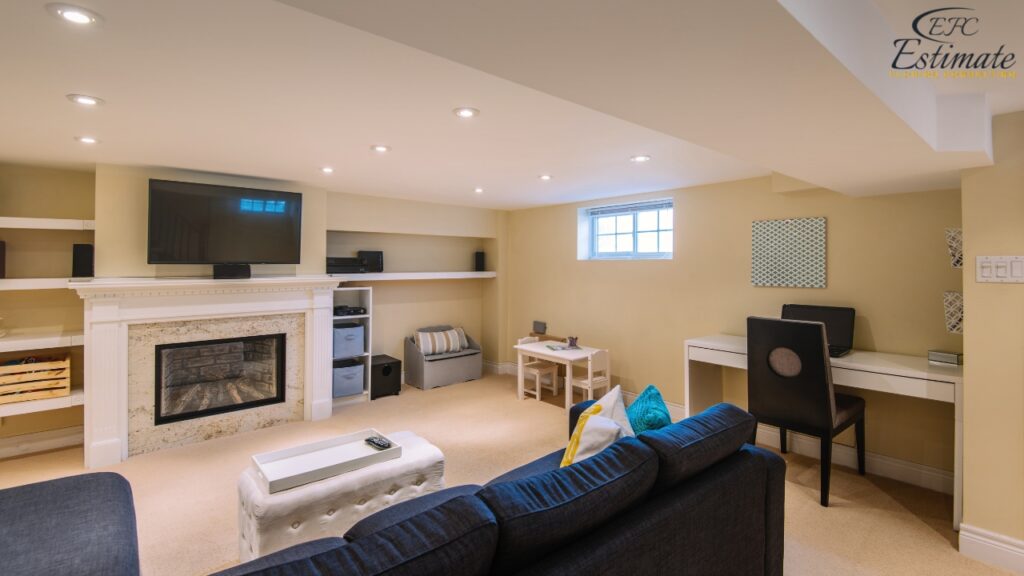
Adding a guest bedroom to the basement maximizes space and provides a comfortable accommodation for visitors. The cost of a guest bedroom renovation generally falls between $5,000 and $15,000. This includes installing drywall, appropriate flooring, lighting, and essential furnishings like a bed and storage. For basements with low natural light, additional lighting or larger windows may also be considered to create a welcoming atmosphere.
Home Gym
A home gym in the basement can be a convenient, long-term investment that eliminates monthly gym fees. Renovating a basement for a gym setup typically costs between $7,000 and $20,000. This budget allows for durable flooring suitable for workouts, basic soundproofing to minimize noise, and space for gym equipment. Costs may increase with the addition of specialized equipment, mirrors, ventilation, or climate control to create a comfortable workout environment.
Office Space
A basement office provides a private, quiet workspace that’s ideal for remote work or studying. Renovation costs for a basement office range from $5,000 to $15,000, covering insulation, flooring, and lighting as well as internet and electrical setup. Soundproofing may be considered for added privacy, and ergonomic furniture can enhance productivity. Additional design touches, such as shelving or custom desks, may increase functionality and comfort.
In-Law Suite
An in-law suite in the basement is a valuable addition, offering a fully functional, self-contained living area. The cost for an in-law suite typically ranges from $20,000 to $50,000, as it may include a kitchenette, bathroom, and separate sleeping and living areas. Additional expenses stem from plumbing and electrical work required to support the kitchenette and bathroom, as well as custom storage, quality flooring, and safety features like egress windows. An in-law suite can enhance the home’s value by providing a versatile space for family members or guests.
Types of Basement Renovations
Basic Finished Basement
A basic finished basement focuses on simplicity and affordability, incorporating essential elements like basic flooring (e.g., carpet or laminate), painted walls, and standard overhead lighting. This type of renovation is ideal for creating a functional storage area, playroom, or simple workspace without the expense of advanced finishes. Basic finishes add usable space to the home, enhancing utility without extensive upgrades. For homeowners looking to maximize square footage with minimal investment, this option provides an efficient solution that can be easily customized over time.
Mid-Range Basement Renovation
A mid-range basement renovation includes upgraded finishes for a more polished and comfortable space. Common features include vinyl plank or laminate flooring, insulated drywall for improved temperature control, recessed lighting, and built-in storage options like custom shelving. This type of renovation is well-suited for creating versatile family rooms, home offices, or recreational areas that can adapt to various needs. With a mid-range renovation, homeowners enjoy a balance of quality and cost, making it a popular choice for adding value to the home while creating a multi-functional living space.
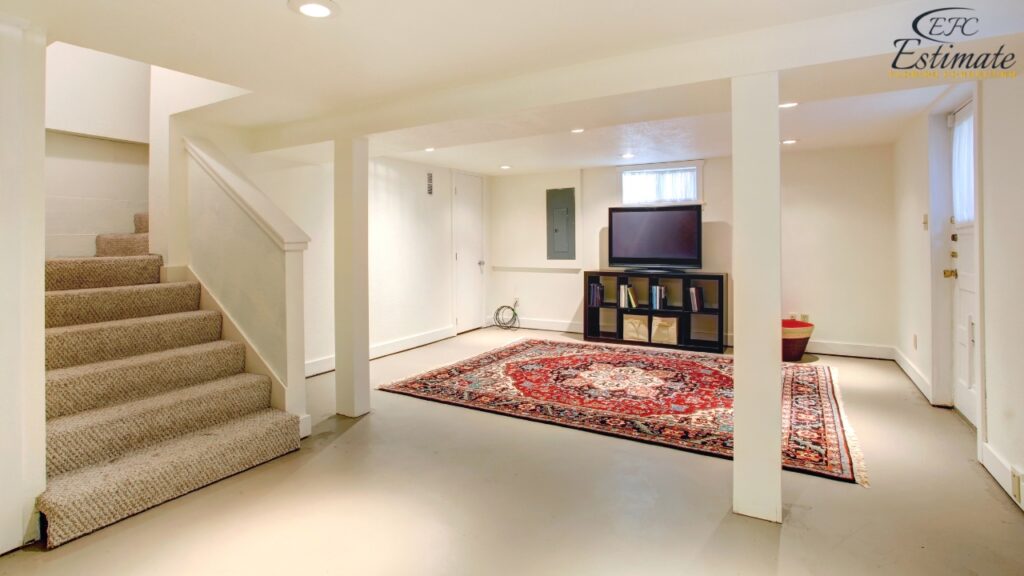
High-End Basement Remodel
High-end basement remodels aim to fully transform the basement into a luxurious living area with high-quality materials and added amenities. These remodels often include hardwood or premium tile flooring, custom cabinetry, advanced lighting options (such as dimmable or smart lighting systems), and features like a wet bar, home theater, or full bathroom. Designed to replicate the look and feel of above-ground living spaces, high-end remodels can even serve as guest suites or independent living quarters. Although this type of remodel requires a significant investment, it increases property value, enhances home appeal, and provides homeowners with a refined, comfortable space for entertainment or additional living quarters.
Get Acquainted
12 Construction marketing strategies
Factors Affecting Basement Renovation Costs
Size and Layout of the Basement
The size and layout of a basement are fundamental cost factors in any renovation project. Larger basements require more materials, such as drywall, flooring, and paint, along with increased labor and time, driving up costs. Layout also plays a key role: an open floor plan may be simpler and less costly to execute than segmented rooms, which require additional framing, electrical work, and potentially separate HVAC zones. The layout’s complexity can directly influence both the design process and construction needs, affecting overall expenses.
Finishing Level
The finishing level chosen for a basement renovation significantly impacts the budget. A basic finish, which includes simple flooring, painted walls, and minimal lighting, remains more affordable and is suited for homeowners seeking functionality with minimal aesthetic additions. Conversely, a high-end finish with luxury elements like custom cabinetry, premium flooring, recessed lighting, and advanced HVAC systems will command a higher price. The level of finish dictates the quality and type of materials used and determines the labor skills required, both of which affect the final cost.
Materials and Design Choices
Materials and design preferences are major cost drivers in basement renovations. Opting for premium materials, such as hardwood or luxury vinyl plank (LVP) flooring, will increase the budget compared to using more affordable options like carpet or laminate. Similarly, choosing high-end cabinetry, granite countertops, or designer fixtures can elevate both the cost and appeal of the space. Design choices also influence labor costs; intricate finishes and custom designs often require specialized expertise, which can increase labor expenses but contribute to the basement’s long-term value and aesthetic appeal.
Structural Modifications
Structural changes, such as adding or removing walls, installing egress windows, or reinforcing foundation walls, add complexity and cost to a basement renovation. These modifications may be essential for creating a functional, compliant living space but can require specialized contractors and potentially additional permits. Egress windows, for example, may be necessary to meet building codes for basement bedrooms, ensuring safe exit routes. Foundation reinforcements or moisture barriers might also be needed to maintain structural integrity, particularly in older homes. These structural adjustments can substantially increase project costs but ensure a safe, code-compliant, and comfortable finished space.
Download Template For Basement Renovation Project Breakdown
- Materials list updated to the zip code
- Fast delivery
- Data base of general contractors and sub-contractors
- Local estimators

Conclusion
Basement renovation costs vary widely depending on project scope, material choices, and finishes. Basic renovations start around $20,000, while high-end remodels with premium features can exceed $70,000. Key cost drivers include flooring, wall finishes, lighting, HVAC, and plumbing, which collectively enhance functionality and comfort. Creating specific rooms like a home theater, gym, or in-law suite can add value to the home and offer tailored living spaces. By carefully planning the layout, selecting suitable materials, and choosing the right level of finish, homeowners can achieve a versatile and appealing basement that aligns with their budget and lifestyle.
Question Answer
Frequently Asked Question
Basement renovations typically range from $20,000 to $80,000, with basic finishes costing between $20,000 and $35,000, mid-range projects between $40,000 and $60,000, and high-end remodels up to $100,000.
Key factors include the scope of the project, choice of materials, finishes, layout complexity, and any structural modifications needed.
Flooring costs vary by material: Carpet is $3–$7 per square foot, vinyl plank is $5–$10, tile is $8–$15, and hardwood is $10–$20.
Options include drywall ($2–$4 per square foot), paint ($1–$3), drop ceiling tiles ($4–$8), and drywall ceiling ($5–$10).
Recessed lighting costs $100–$200 per fixture, electrical wiring is $2,000–$4,000, and outlets/switches cost $50–$150 each.
Plumbing costs vary: Bathroom plumbing is $3,000–$6,000, wet bar plumbing is $1,500–$3,500, and laundry room plumbing is $1,000–$3,000.
Extending ductwork costs $1,000–$3,000, mini-split systems are $2,000–$5,000, and ventilation upgrades range from $500 to $1,500.
Common options include home theaters ($10,000–$30,000), guest bedrooms ($5,000–$15,000), home gyms ($7,000–$20,000), office spaces ($5,000–$15,000), and in-law suites ($20,000–$50,000).
- Basic: Involves essential elements, such as simple flooring, painted walls, and minimal lighting ($20,000–$35,000).
- Mid-Range: Adds upgraded finishes, like vinyl flooring and recessed lighting ($40,000–$60,000).
- High-End: Features luxury materials, custom cabinetry, and added amenities like wet bars and theaters ($70,000–$100,000).
- Larger basements and complex layouts with segmented rooms require more materials and labor, increasing costs.
Comprehensive Trade-Specific Estimates
At Estimate Florida Consulting, we offer detailed cost estimates across all major trades, ensuring no part of your project is overlooked. From the foundation to the finishing touches, our trade-specific estimates provide you with a complete and accurate breakdown of costs for any type of construction project.

Testimonials
What Our Clients Say
We take pride in delivering accurate, timely, and reliable estimates that help contractors and builders win more projects. Our clients consistently praise our attention to detail, fast turnaround times, and the positive impact our estimates have on their businesses.
Estimate Florida Consulting has helped us win more bids with their fast and accurate estimates. We trust them for every project!

Steps to Follow
Our Simple Process to Get Your Estimate
01
Upload Plans
Submit your project plans, blueprints, or relevant documents through our online form or via email.
02
Receive Quotation
We’ll review your project details and send you a quote based on your scope and requirements.
03
Confirmation
Confirm the details and finalize any adjustments to ensure the estimate meets your project needs.
04
Get Estimate
Receive your detailed, trade-specific estimate within 1-2 business days, ready for your project execution.





